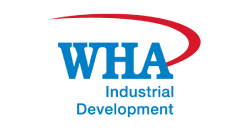บทความ
Customer Showcase: Tadano (Thailand) Co., Ltd.- Manufacturer of Automobile-mounted Cranes
02/04/2557A leading manufacturer of construction cranes and elevated platform service vehicles, Tadano Co., Ltd. is headquartered in Takamatsu City in Kagawa Prefecture. In April 2012, the company established Tadano (Thailand) Co., Ltd., a locally owned subsidiary, at the Eastern Seaboard Industrial Estate (Rayong) - ESIE. With a capital investment of 3,100 million baht, the facility currently employs 29 people (including four Japanese). Later, in June 2013, Tadano (Thailand) opened and started normal operations at a new factory for manufacturing cargo cranes (automobile-mounted cranes) with floor space of 6,400 square meters, which occupies a land area of 29,000 square meters. The facility has become Tadano’s fifth production base, after Japan, the U.S., Germany, and China.

According to the company’s president, Mr. Yasumasa Kuramae, the cargo crane is a type of crane mounted behind the driver’s seat of a truck that enables one to carry out landscaping work as well as the loading, transporting and unloading of construction materials using only a single truck, with a minimum number of workers. It provides one with both mobility and safety, as well as with the ability to compensate for the lack of workforce at logistics and construction sites in Thailand, where the labor shortage is becoming more acute.
The production capacity of the new factory is 1,000 units per year. In fact, the facility manufactures two types of cranes for trucks, which are capable of lifting up loads of 5 tons and 8 tons respectively, and which are sold domestically through local dealers in Thailand for the time being.
Beginning in the second half of next year, Tadano will work on the expansion of sales and the improvement of after-sale services in India, the Middle East and Africa, with the aim to increase the company’s overseas sales ratio to 60%.
Tadano plans to build a second plant on the same premises of its ESIE land holding in 2015, carefully considering the economic conditions of emerging markets. Accordingly, the company will increase the type of cranes they manufacture, and expect to double yearly production by 2018 to 2,000 units. Furthermore, Mr. Kuramae expresses his intention to push forward the production of parts and components within Tadano in order to decrease production costs. In addition, the company intends to increase the local supply rate to 70% within the next three years, which currently stands at around 30%.

Tadano also considered Indonesia and Vietnam as potential production bases in Asia, but eventually the Japanese firm chose Thailand. The country is strategically located in the ASEAN region, possesses a globally-integrated import/export base, maintains an extensive infrastructure network, and has a high quality workforce. Moreover, Mr. Kuramae explains the reason why Tadano selected Hemaraj as a local partner saying, “Hemaraj’s industrial estate is located in the Eastern area which is free from flood risk, and also enjoys the benefits of well-established infrastructure, such as electricity and water. In addition, Hemaraj staff responded most enthusiastically to our inquiries and provided us with the best consultation.”
Equally important to highlight, Tadano is very active in social contribution activities. For instance, a special disassembly jig was developed by Tadano and used for the Stone Chamber Dismantlement project at the Takamatsuzuka ancient burial mound located in Asuka village, Nara Prefecture. The company also has donated cranes and elevated platform service vehicles for the purpose of supporting restoration work at the Angkor monument complex in Cambodia as well as of the Moai statues on Easter Island off the coast of Chile. Mr. Kuramae illustrates his positive attitude towards making further contributions to Thai society, in terms of cultural preservation projects, when stating, “We would like to consider providing support for restoring the Ayutthaya monuments, which were affected by the great flood in 2011, if requested by the Thai government.” He also values the contributions of the company’s 25 local staff. Tadano places a high priority on keeping a family atmosphere, and arranges activities/celebrations on memorable dates such as staff birthdays.
As for the future prospects of the crane market, growth in Japan’s domestic market is not expected to be high. On the other hand, demand in developing countries, which have a wealth of natural resources, is estimated to expand as a whole. The percentage of Tadano’s sales overseas, as a part of the consolidated net sales of the company, is currently 48%, but Tadano aims to increase the ratio to 80% in the future, under their policy to accelerate overseas business expansion in Thailand.
Within Thailand, Tadano will try to achieve high profile first by selling small-sized cargo cranes often seen on work sites, even in town. And after that, the company plans to introduce larger products in the Thai market. Indeed, Tadano’s vice president, Mr. Sadatake Akita, expresses his enthusiasm, when declaring, “We would like to make Thailand look Blue by selling many Tadano cranes, which are painted in Tadano’s corporate color, Blue.”
The company sent six of its staff to the Tadotsu factory for training in Japan, where Tadano produces cargo cranes for the Japanese domestic market, for six months prior to the commencement of operations. Furthermore, Mr. Kuramae strongly believes in his vision to train and to educate Tadano’s Thai staff so that they can successfully manage product development, which is performed in Japan at the moment.
Remarks: The article was written for Hemaraj Newsletter April 2014 Vol. 30 No. 1.

